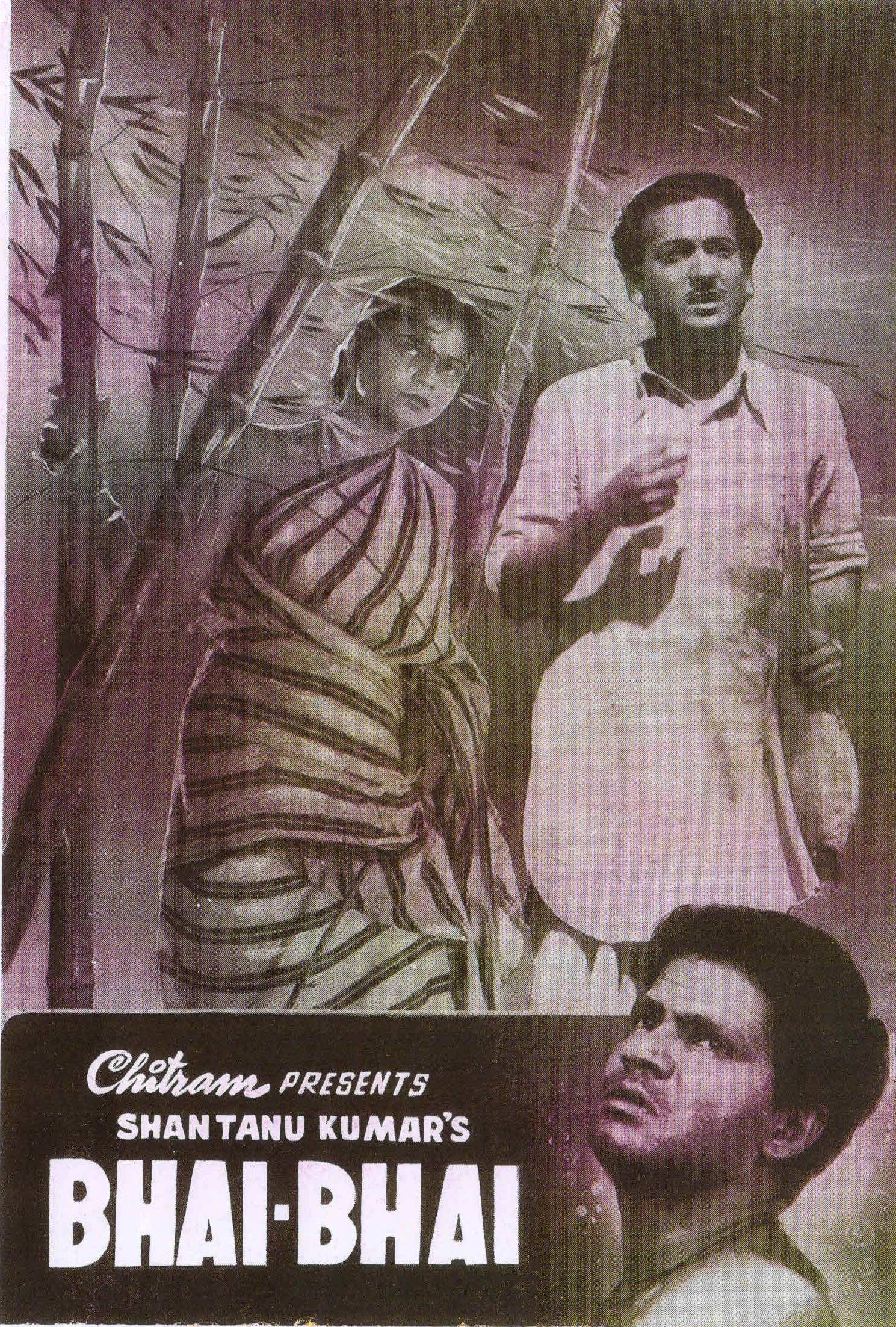'BHAI BHAI' (Odia) - 1956
-
Banner:
CHITRAM
-
Produced at:
TECHNICIAN STUDIO &
RADHA FILM STUDIO
-
Processed at:
BENGAL FILM LABORATARY Pvt. Ltd.
-
Distributed by:
Motion Picture Producers, GangaMandir, Cuttack 1.
-
Produced by:
Gour Prasad Ghose
-
Story:
Santanu Kumar Das
-
Screenplay & Direction:
Nitai Palit
-
Dialogue:
Manoj Das
-
Camera:
Dinen Gupta
-
Editor:
Debidas Ganguly
-
Chief Editor:
Biswanath Naik
-
Music:
Bhubaneswar Mishra &
Balakrushna Das (Bhuban-Kissen)
-
Background Music:
Bhuban-Balsara (National Orchestra)
-
Lyrics:
Parashuram Patnaik & Manoj Das
-
Playback Singers:
Kamala Debi & Balakrushna Das
-
Song Recording:
Satyen Chatterjee
-
Make-Up:
Manotosh Roy
-
Sound:
Durgadas Mitra at Outdoor Sound by Sight & Sound Pvt. Ltd.
-
Art:
Dibyasingh Giri, Anil Pyne
-
Production Managers:
Natabar Rath & Kamalakar
-
CAST:
Gour Prasad Ghose
Chapala (Parbati Ghose)
Child Artiste : Kishore
Radharani, Lakhsmipriya Mahapatra, Lila Dulari, Sailabala
Samuel Sahu (Babi), Srikanta
Priyanath Misra (Pira), Sachidanand
Binode, Udaynath, Bhabani, Lakshman, Abani, Gobinda, Purna,
Bhagabati, Hemanta, Suvash, Nagendra, Akshay, Natabar, Jalil
After “Kedar Gouri”, Gour Prashad’s unfulfilled desire to venture into production was rekindled.
Interestingly, at this crucial time he met Santanu Kumar Das who was a writer and also a Minister in the cabinet of then CM Nabakrushna Choudhury.
Being head of the Orissa Dalit Sangh, Santanu Das was motivated to create awareness about untouchability. He thus penned a story to this effect.
This story made it possible, for the actor Gour Prashad to become Producer. His dream was finally realized and “Bhai Bhai” was produced in 1956 under his banner Chitram. He was only 27 yrs of age.
His association with Nitai Palit had by now grown into a deep friendship and they were often referred to as Nitai-Gour.
By virtue of this camaraderie Gour Prashad offered Nitai Palit to independently direct and write the screenplay of this movie.
They exchanged books on ideas to aid this major directorial debut although Palit was already a much experienced and popular stage play director.
The noted writer Manoj Das was roped in for lyrics and dialogues.
Chapala Naik of “Amari Gaan Jhua” fame was once again the leading actress opposite Gour Prashad. This was her second film as female lead.
Since she was just a teenager, her maternal grandmother Durga Das accompanied her throughout the shooting.
Dinen Gupta, Asst. cameraman in Satyajit Ray’s “PatherPanchali”, was given a break as an independent cinematographer.
Gour-Parbati were fortunate to get constant assistance from Govt. officials and from noted literates.
The Information & Public Relations Dept. and then C.M. Nabakrushna Choudhury, extended utmost support for “BhaiBhai”.
In fact, the CM would often visit the shooting sites and was enthralled by the portrayal and picturization.
It was indeed a movie which was quite ahead of its times.
Many established stage and radio artistes were introduced into the Cine World....
- Music by Bhubaneswar Mishra and Balakrushna Dash, under the name Bhuban-Kissen.
- Laxmpriya, stage artiste and wife of Odissi Exponent Guru Kelucharan Mahapatro, debuted in cinema.
- Established stage artistes like Samuel Sahoo, Priyanath Mishra, Leela Dulali and radio personalities like Sachi Das, Srikanta Mohanty and Radharani Sarkar were all prominent part of this movie as actors.
“Bhai Bhai” was the 8th Odia film ever made and the 5th Odia movie to be based on relevant social issues.
It addressed the caste system and the social stigma attached with it.
Gour Prashad’s rigorous five years of training in Prithvi Theatres, Bombay (Mumbai), was put to test with this extremely daring project of its time.
He was greatly motivated and influenced by Prithviraj Kapoor.
At a time when shooting in studios was popular, this movie was filmed completely on outdoor locations in the village of Arilo.
It was released at Prabhat Cinema, Cuttack on 21st July 1956, just a month after receiving the censor certificate.
Gour Ghose’s first venture was highly acclaimed and appreciated by all, for its artistic depiction of a social issue.
Unfortunately, the film is nowhere to be found now, to be appreciated and enjoyed by today’s generation. However, the search is on.
